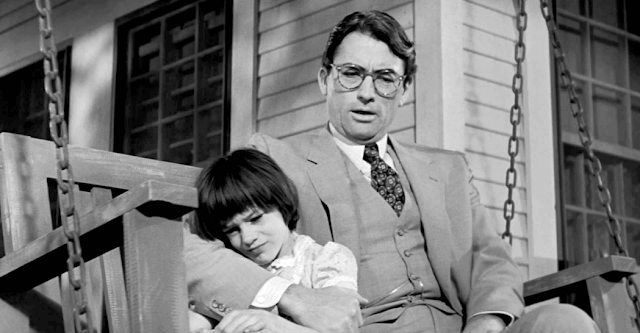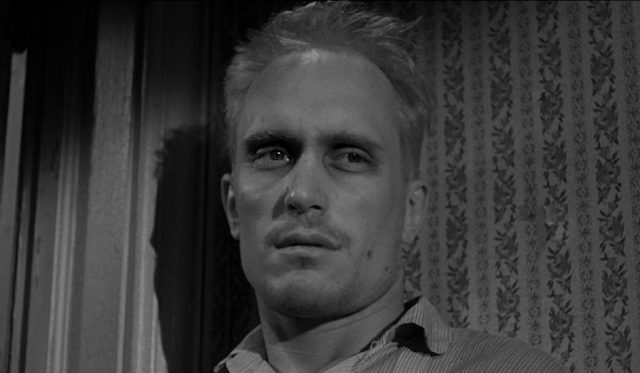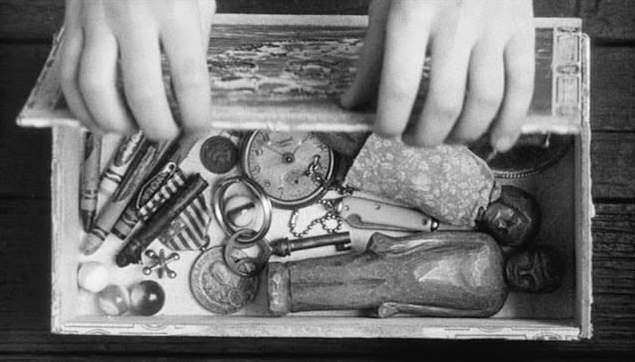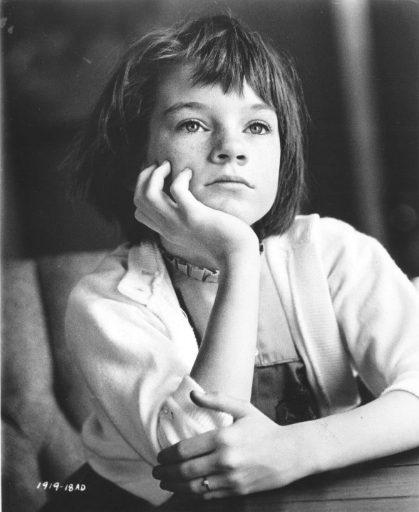 |
| 1962's "To Kill a Mockingbird" may have a race trial as its dramatic centerpiece, but the heart of the film is the story of a father, through his child's eyes. |
The film adaptation of Harper
Lee’s classic story, To Kill a
Mockingbird, celebrated its 60th anniversary Christmas Day, 2022.
***Spoilers Ahead***
Some who look at this
story where race is the centerpiece feel it's too genteel or focused on the
white Finch family. To Kill a Mockingbird
was a major step toward dealing with race on film at the time it was made six
decades ago. If the story was truly a sugar-coated fairy tale, Atticus Finch would
have won his case and Tom Robinson wouldn't have been killed.
 |
| Small-town lawyer Atticus Finch & his client, Tom Robinson, who is accused of raping a white woman, in "To Kill a Mockingbird." |
Also, To Kill a Mockingbird is truly about
Atticus Finch’s family, through the eyes of daughter Scout, based on Lee's own
upbringing. It's a slice of life of the south during the height of the
Depression.
 |
| "To Kill a Mockingbird" author Harper Lee, with her fictional childhood counterpart, Mary Badham, as Scout. |
The film couldn’t be
made in Harper Lee's actual hometown as it was too modernized 30 years later.
The fictional town of Maycomb, Alabama was recreated realistically on the
Universal back lot. The look and lifestyle of the small town is not prettied
up. Peck looks realistically rumpled, as the lawyer and widowed father. The
kids are dressed like real children, who run outside all day. Nobody lives in a
fanciful Hollywood version of a rural home. Also, To Kill a Mockingbird is of the few period films of this era where
the visuals look authentic.
 |
| Small-town life is beautifully and realistically captured in "To Kill a Mockingbird." |
Universal's biggest
star, Rock Hudson, wanted very much to play small town lawyer Atticus Finch. He
probably could have done a good job, too. Hudson had the same quiet strength
and commanding speaking voice that Peck possessed. And Rock was probably closer
in age to Atticus, where as Peck was in his mid-40s. But Gregory Peck was more seasoned
as an actor and was the perfect choice to play Atticus Finch, the same way
Clark Gable was born to play Rhett Butler. Author Lee was so pleased by Peck’s
performance that she gave him her father’s watch, when the real lawyer had
died, shortly after the film was made.
 |
| A number of name actors might have been quite good as Atticus Finch, but Gregory Peck was a natural fit for the character and actor, in "To Kill a Mockingbird." |
Peck commented on how
this role was perhaps his easiest, due to his similar upbringing. The actors
were perfectly cast, with a script that captures the southern era by Texan-born
playwright Horton Foote. Also, a young production and direction team, Alan
Pakula and Robert Mulligan, imbued the film with genuine feeling without
becoming overly sentimental.
 |
| Mary Badham as the fearless tomboy Scout, in "To Kill a Mockingbird." |
The children are bright,
articulate, and natural. Mary Badham as “Scout,” aka Jean Louise Finch, is
incredibly open as the free-spirited tomboy. Her observations, both silent and
verbal, give emphasis that this story is told through her eyes. Phillip Alford
is equally impressive as Jem, Scout’s slightly older brother. As the boy who
longs to be “grown up,” Alford seems like an old soul, with his piercing,
inquiring eyes. Both Badham and Alford make this famous pair of siblings
effortlessly believable. John Megna is “Dill” Harris, the visiting neighbor boy
who the siblings befriend. Lee based him on childhood friend Truman Capote.
 |
| Phillip Alford is intense as precocious older brother Jem, in "To Kill a Mockingbird." |
Mockingbird
has a stellar supporting cast: Alice Ghostley as Dill’s caregiver, Paul Fix as
the judge, Rosemary Murphy as the neighbor, and Robert Duvall in his haunting film
debut as Boo Radley. Brock Peters is intense as Tom Robinson, the young black
man accused of raping a young white woman. Peter’s piercing eyes convey the
character’s fear of contradicting her accusations. Nostrils flaring, sweating,
eyes glittering, Peters’ field hand seems about to explode in fear. Contrast
that with William Windom, as the prosecutor. His lazy demeanor is subtly
illustrated with one leg hanging over his chair, listening for anything to
pounce upon. James Anderson and Collin Wilcox are believably hateful as the
father and daughter accusing the black man of rape. Kim Stanley is the wryly
warm narrator, as the adult Scout.
 |
| Robert Duvall made his film debut as the much-talked about, but little-seen Boo Radley, in "To Kill a Mockingbird." |
Gregory Peck was not
the most versatile or expressive actor of his era, but like Fonda and Cooper,
when he was well-cast, Gregory Peck was memorable. As Atticus Finch, Gregory
Peck was iconic. I hate “lists” from magazines and organizations that often feel
self-promotional, but the American Film Institute (AFI) declared Atticus Finch as
film’s #1 heroic character—and I’d agree. Peck’s decency, empathy, and warmth
are perfect for Atticus. Some of the key people involved in this film remained
friends: Brock Peters gave the eulogy at Gregory Peck’s funeral and said that
Greg and Atticus were one and the same; Mary Badham stayed in touch with Peck
and used their characters’ names as their nicknames for one another; and while
Harper Lee was rather reclusive, she stayed in touch with Peck. All this
off-screen bonding is evident on-screen.
 |
| A classic moment in "To Kill a Mockingbird," when Atticus Finch loses in his attempt for justice for Tom Robinson, but wins the respect of the local black community. |
The opening credits
are simple, but striking, depicting a child’s secret world. The Elmer Bernstein
score and Russell Harlan’s black and white cinematography are atmospheric and
lovely. A veteran director like William Wyler might have done just as fine of a
job with To Kill a Mockingbird. But
Robert Mulligan focuses on naturalistic performances and realistically conveys
the story through the eyes of a child. The movie has moments of sentiment, but
mostly it's underplayed.
 |
| The opening credits in "To Kill a Mockingbird" are simple, yet so imaginative. |
Six decades letter, To Kill a Mockingbird tells a
still-relevant story, and the film version of Harper Lee’s novel is
straightforward and beautifully told, which is why it still endures today.
 |
| The expressive face of Mary Badham, as Scout, in "To Kill a Mockingbird." |

This is a beautiful review of one of the best films ever made. One of those rare instances when the film is every bit as good as the novel. I haven't seen this is years, but I find myself tearing up just looking at the photographs. Thank you, Rick!!
ReplyDeleteThank you, Mike! This film has been shown in theaters on a limited basis, with it's major anniversary. I'd love to see it on the big screen. Cheers, and happy holidays, Rick
DeleteI think although Gregory Peck never made a bad movie, his best role was in "To Kill a Mockingbird."
ReplyDelete